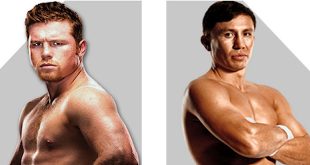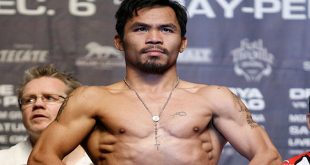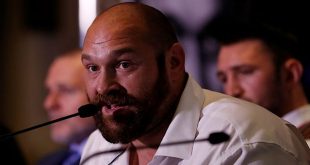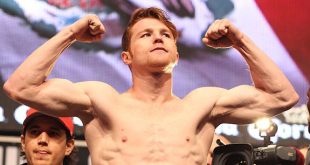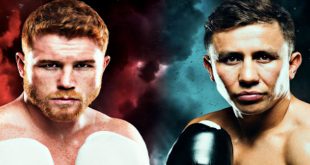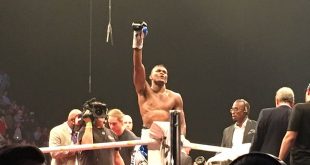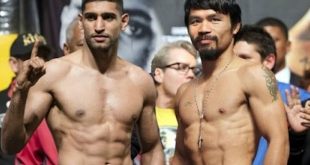| It is official. Athens 2004 Olympic lightweight Silver medalist Amir Khan is to turn professional with none other than Frank Warren as his promoter and manager. The not so shocking announcement came in the immediate aftermath of the eighteen-year-old prodigies’ rousing 19-13 | 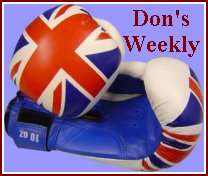 |
triumph over amateur legend, Mario Kindelan, last Saturday night. The bout happened at the Reebok stadium in Bolton and was shown live on ITV, was watched by an estimated 6.3 million people around Britain and unfolded as a perfect, if not slightly manufactured, springboard for what was an inevitable transition into the paid ranks for the Bolton quicksilver. According to Warren, Khan will make his debut in July at the Excel arena in London on the under-card of the British heavyweight title-fight between the unbeaten Matt Skelton and former WBC title challenger Danny Williams. As for Kindelan, the time has come to bid him a fond farewell as the great man will likely retire at the age of thirty-three as a three-time world and double Olympic champion. He returns home to Cuba as a national hero, and irrefutably goes down in the history books as one of the sports great amateur practitioners.
The world turns and each and every day, countless people die and are born; we mourn the departed and celebrate the miracle of new life almost simultaneously – with death comes life and vice-versa, it is a bittersweet cycle that we have no choice but to accept. A few days ago, we witnessed the fistic equivalent of that inescapable reality somewhat illustrated in the shape of two boxers, one of whom a man defined by a collection of awe-inspiring accomplishments, the other a tenacious and remarkably talented teenager with ability unbefitting of his age. It is a startling rarity that, on the same night, the end of one career should coincide so closely with the birth of another. Of course, I am not naïve enough to believe for one second that such a thing happened purely by chance, because it didn’t, yet the correlation of the contrasting events (Kindelan retiring and Khan turning pro) was still, in its own way, memorable nonetheless.
The incomparable Cuban arrived in Britain – not having been defeated in a staggering forty-two contests dating back to 2002 – cloaked in an intimidating aura of invincibility. Kindelan came here as the recognized number one amateur pugilist on the planet and with the comfortable nature of his Gold medal winning victory over Khan still vivid in our memories. Kindelan entered the ring as the clear bookies favorite to once again repel the youngster’s whirlwind attacks and add another digit to his unbelievable winning streak. The match-up of the two combatants (their third meeting) symbolized experience against youth in its rawest form. In their Athens argument we watched as the Cuban southpaw put on a masterful display of counter-punching brilliance to tame and out-score the then seventeen-year-old Khan en route to a clear cut points win; experience prevailed that day, just as it had when they crossed paths a few months earlier. So, the fact that Khan doggedly sought out a third clash with his Olympic conqueror to settle the score is indeed highly commendable, and a true testament to the teen’s competitive nature; was it a move that could have backfired though?
Not really, it is true that a third loss to Kindelan would have put a dampener on his farewell party, but let’s remember that it was not a fight that Khan was expected to win; we (the public) knew all too well who he was up against, and understood that the odds were stacked very heavily against him. There would have been absolutely no shame in someone so young coming up short against a fighter of Kindelan’s undeniable greatness; he was therefore in a win-win situation. It should also be noted that the result – win, lose or draw, had zero bearing on the subsequent announcement of his departure into the realms of professional prizefighting. It had already been agreed beforehand that, regardless of the outcome, it would be the final time that he attired a vest and headgear into the ring. Many hoped that Khan, for the sake of gaining more experience, would resist going down the professional route for at least another year, but with the huge sum of money presumably being dangled in front of his nose courtesy of a certain promoter vying for his signature, one can hardly blame him for cashing in on his talent. The boat was there, I suppose that he did not want to risk missing it.
In front of a celebrity-filled audience, a focused and composed Amir Khan roared out of his corner with the same fiery determination that had taken him to an Olympic final, but not past Kindelan who had bettered him in both their previous meetings. He had now matured though, mentally and physically. Before, he had simply rushed in throwing non-stop leather in an attempt to overwhelm Kindelan, who in turn had no trouble picking him off with classy counters to score crucial points. This time however, Khan patiently sat back and forced his opponent, a famed counter-puncher, to do something to which he was unaccustomed, and obviously did not like: lead. Kindelan resembled a fish out of water when initiating the exchanges; it was a strategy executed to perfection by Khan as he turned the tables on the Cuban and effectively beat him at his own game. In the end, it was clear that he had landed the more telling and frequent blows over the four rounds, including a flush left hook in the final frame that momentarily staggered Kindelan, to secure what must have been a hugely satisfying and emotional victory.
The worst kept secret in boxing was confirmed when Frank Warren dramatically announced immediately after the stunning victory, “Amir’s debut on the 16th of July will be the start of a journey that will hopefully lead to him becoming Britain’s youngest ever world champion. I am really excited and looking forward to working with him to achieve this.” Featherweight phenomenon Naseem Hamed currently holds that particular distinction, having won the WBO crown at the age of twenty-one. That gives Khan roughly three years in which to steal that record.
Kindelan, clearly impressed, had this to say after the loss, “Amir has a higher level and a higher quality than all the rest. When I fought against Felix (Trinidad) he didn’t have as much quality as Amir has.” He continued, “Amir’s speed and movement make him a very hard fighter to beat. He is very young and has a lot of ambition. He is the best fighter I have fought.” Now that he is officially retired, Kindelan will assume a major coaching role in Cuba and hopefully, he will return to Britain in the future to pass on some of his wisdom to our leading amateur talents.
For Khan, fame, riches and greatness are all now there for him to grab. “This time I knew I was boxing Kindelan and I knew his style, we’d been working on it for a long time. I beat the best in the world,” said Khan afterwards. “I knew his style. I was thinking, “This is easy work,’ but I knew I couldn’t go on thinking that because it was Kindelan.” With the win, Khan has successfully erased memories of his Athens disappointment and will now see his professional stock soar.
Next week, I will be looking at British middleweight Howard Eastman. I will be asking, is he a contender or pretender? Stay tuned.
Don Caputo can be reached at don_caputo@hotmail.com
 Boxing News Boxing News
Boxing News Boxing News
